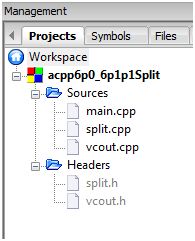This is Part 2 of the 7-part Exercise 6-0. Click here to see the other parts.
Exercise 6-0 (Part 2 / 7)
Relating to section 6.1.1 of the textbook (page 103-105). Implement and test out an alternative way to split a line into words using the find_if utility from the <algorithm> directive. The original split function method was first introduced in S5.6/88 of the book.
The Project
This section summarises the partitioned program in the form of C++ source and header files.

Source File List
Header File List
Source Files
main.cpp
</p>
<h1>include <iostream></h1>
<h1>include <string></h1>
<h1>include <vector></h1>
<h1>include "vcout.h"</h1>
<h1>include "split.h"</h1>
<p>using std::string;
using std::vector;
using std::cin;
using std::cout;
using std::endl;</p>
<p>int main()
{
// Read a line of input, split into words, and display
string line;
vector<string> words;
while (getline(cin, line)) {
vector<string> words = split(line);
vcout(words);
}</p>
<pre><code>return 0;
</code></pre>
<p>}</p>
<p>
split.cpp
</p>
<h1>include <string> // string</h1>
<h1>include <vector> // vector</h1>
<h1>include <cctype> // isspace</h1>
<h1>include <algorithm> // find_if</h1>
<p>using std::vector;
using std::string;
using std::isspace;
using std::find_if;</p>
<p>// true if the argument is whitespace, false otherwise
// (S6.1.1/103)
bool space(char c)
{
return isspace(c);
}</p>
<p>// false if the argument is whitespace, true otherwise
// (S6.1.1/103)
bool not_space(char c)
{
return !isspace(c);
}</p>
<p>// Scan a line and split into words. Return a vector that contains these words.
// (S6.1.1/103)
vector<string> split(const string& str)
{
typedef string::const_iterator iter;
vector<string> ret;</p>
<p>iter i = str.begin();
while (i != str.end()) {</p>
<pre><code>// Ignore leading blanks
i = find_if(i, str.end(), not_space);
// Find end of next word
iter j = find_if(i, str.end(), space);
// Copy the characters in ([i, j)
if (i != str.end())
ret.push_back(string(i, j));
// Re-initialize
i = j;
</code></pre>
<p>}
return ret;
}</p>
<p>
vcout.cpp
</p>
<h1>include <iostream></h1>
<h1>include <string> // string</h1>
<h1>include <vector> // vector</h1>
<p>using std::cout;
using std::endl;
using std::string;
using std::vector;</p>
<p>int vcout(const vector<string>& v)
{
for (vector<string>::const_iterator i = v.begin(); i != v.end(); ++i)
cout << (*i) << endl;</p>
<p>return 0;
}</p>
<p>
Header Files
split.h
</p> <h1>ifndef GUARD_SPLIT_H</h1> <h1>define GUARD_SPLIT_H</h1> <h1>include <vector></h1> <h1>include <string></h1> <p>std::vector<std::string> split(const std::string&);</p> <h1>endif // GUARD_SPLIT_H</h1> <p>
vcout.h
</p> <h1>ifndef GUARD_VCOUT_H</h1> <h1>define GUARD_VCOUT_H</h1> <h1>include <string></h1> <h1>include <vector></h1> <p>int vcout(const std::vector<std::string>&);</p> <h1>endif // GUARD_VCOUT_H</h1> <p>
Test Program
By entering a text line, say, “The quick brown fox jumped over the fence”, the program should be able to dice in into words and display accordingly.
The quick brown fox jumped over the fence The quick brown fox jumped over the fence ^Z